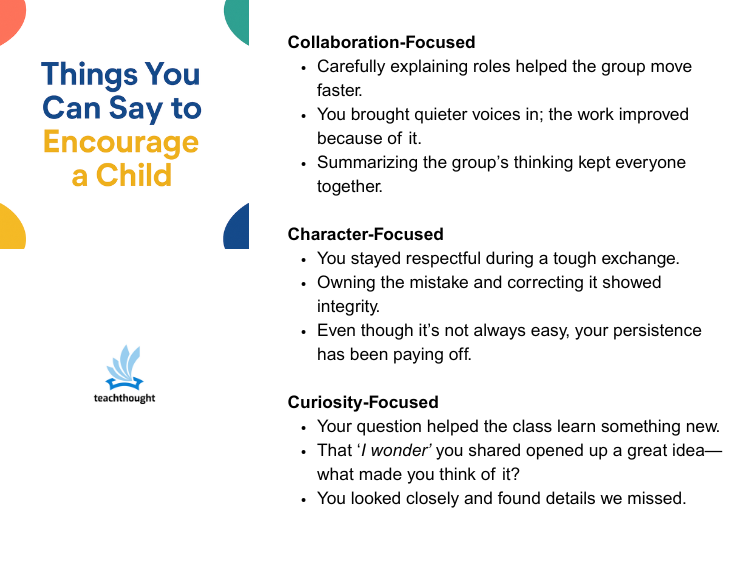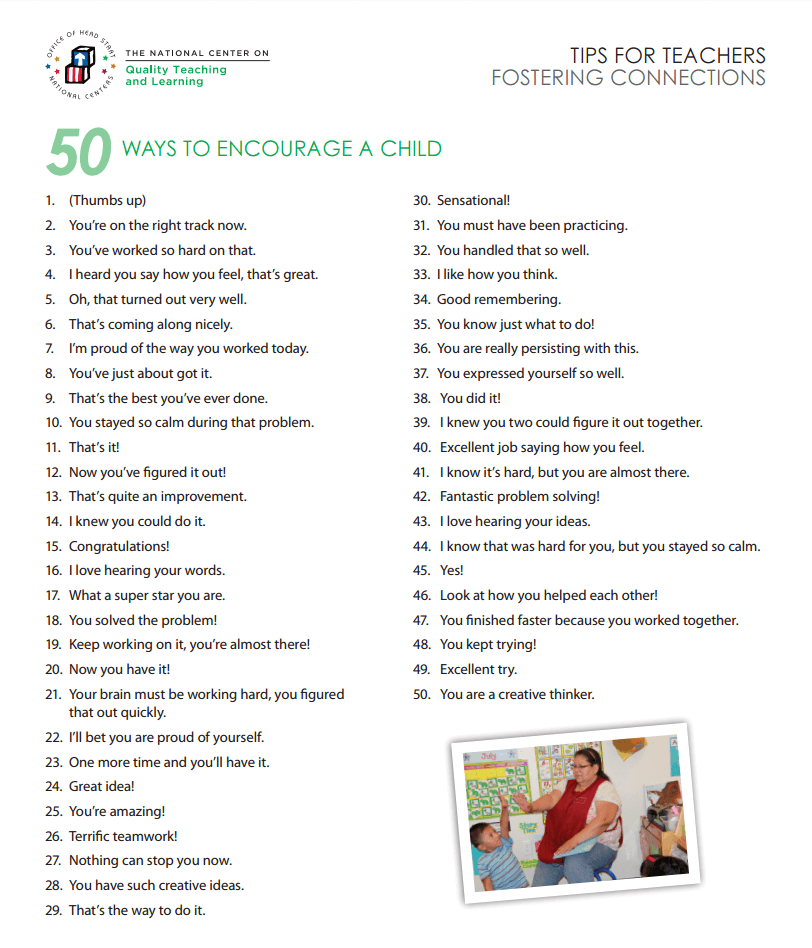
Things You Can Say To Encourage A Child
by TeachThought Staff
There are many ways to encourage a child, but for students of any age, honest, authentic, and persistent messages from adults that have credibility in their eyes are among the most powerful.
The National Center on Quality Teaching and Learning has put together a graphic below–50 Ways To Encourage A Child. It was designed for younger students (head start/kindergarten), so we thought we’d create another list more diverse in the types of praises and to students of different ages and grade levels.
You can find our list immediately below and their graphic after.


See also Need A Lift? Here Are 50 Books That Can Make You Happy
Short, specific language you can adapt on the fly. Organized by school level and type of encouragement.
Elementary
Effort-Focused
- I noticed that you kept going even when it got tough.
- Your practice shows—look how much smoother that was today.
- You tried more than one time and it made a difference.
Process-Focused
- You chose a new strategy; tell me what made you pick it.
- You checked your work carefully and fixed a slip—where did you spot it?
- The way you explained your steps helped everyone follow along.
Character-Focused
- Thanks for waiting your turn—that was patient and respectful.
- Helping a classmate like that was kind.
- You were honest about what felt hard; that’s brave.
Curiosity-Focused
- Your question helped the class learn something new.
- That wonder you shared opened up a great idea—what made you think of it?
- You looked closely and found details we missed.
Collaboration-Focused
- You listened first and then added your idea—nice teamwork.
- Everyone got a turn because you made space for them.
- You solved it together; what did each person bring?
Self-Reflection Prompts
- What part are you most proud of, and why?
- Where did you get stuck, and how did you get unstuck?
- What’s one thing you’ll try the same way next time?
Middle School
Effort-Focused
- I noticed you stayed with the plan and finished strong.
- Your revisions clearly improved this—what changed the most?
- You set a target and met it; walk me through how you managed that.
Process-Focused
- Comparing two approaches helped you choose the better fit.
- Your notes show how your thinking moved from idea to evidence.
- Feedback shaped this draft—point to a place where it shows.
Character-Focused
- You stayed respectful during a tough exchange.
- Owning the mistake and correcting it showed integrity.
- Calm troubleshooting when the tech glitched kept the work on track.
Curiosity-Focused
- Your “what if…?” pushed the conversation forward.
- Looking for evidence before deciding strengthened your point.
- A follow-up question like that deepens the discussion—ask another.
Collaboration-Focused
- Clarifying roles helped the group move faster.
- You brought quieter voices in; the work improved because of it.
- Summarizing the group’s thinking kept everyone aligned.
Self-Reflection Prompts
- Which strategy helped most today, and why?
- If you had ten more minutes, what would you refine first?
- What did this teach you about how you learn best?
High School
Effort-Focused
- You stayed with the hard part instead of bailing—that mattered.
- Consistency over several days produced this result.
- You balanced speed and accuracy; how did you plan that tradeoff?
Process-Focused
- You set criteria before choosing a solution—smart move.
- Testing an assumption and revising improved your outcome; talk me through the pivot.
- Your evidence chain is clear; which counter-example did you rule out?
Character-Focused
- Composure under pressure kept the work credible.
- Advocating for yourself respectfully got you what you needed without drama.
- Crediting sources and collaborators shows professionalism.
Curiosity-Focused
- Connecting the topic to real-world stakes made your point land.
- Challenging a common assumption is useful—what data backs your angle?
- Exploring an alternative model clarified what the original missed.
Collaboration-Focused
- Facilitating the discussion kept it on target without shutting people down.
- You negotiated roles and deadlines like a project manager.
- I noticed how you synthesized opposing views into a workable plan.
Self-Reflection Prompts
- If you ran this project again, what would you keep, change, or cut—and why?
- Where did feedback actually change your mind?
- Which skill from today transfers to work outside this class?


See also Sentence Stems To Replace ‘I Don’t Know’ Or ‘I Can’t’
You inspire me to be a better teacher by the way you…
70 Things You Can Say To Encourage A Child
Source link



